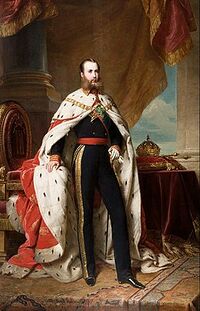José Joaquín of Anahuaco: Difference between revisions
mNo edit summary |
mNo edit summary |
||
| Line 41: | Line 41: | ||
From the early days of his reign, Emperor José Joaquín was notably absent from many of the day-to-day functions of government, preferring to delegate his responsibilities to ministers. In an attempt to bolster his reputation, and foster fondness for the empire amongst the population, the Emperor frequently undertakes royal tours of the empire, seeking to make a personal connection with his subjects. | From the early days of his reign, Emperor José Joaquín was notably absent from many of the day-to-day functions of government, preferring to delegate his responsibilities to ministers. In an attempt to bolster his reputation, and foster fondness for the empire amongst the population, the Emperor frequently undertakes royal tours of the empire, seeking to make a personal connection with his subjects. | ||
== Honours and Awards == | |||
*{{team flag|Constancia|flag}}: [[1727 Extraordinary Investiture|Grand Knight Commander of the Order of the Order of the Royal and Imperial Blood]] (1727) | |||
Latest revision as of 03:39, 4 September 2024

| ||||
| Role: | Emperor of Anahuaco | |||
| Date of birth: | 25th December 1675 | |||
| Born: | Newcastle upon Eastmoor | |||
José Joaquín (born José Joaquín García Tezozómoc in 1660) is the current Emperor of Anahuaco (since 1706), and a descendant of both King Aelfric I of Nova England and of King Jeremy of New Brittania.
He is a Knight of the Holy Lakes by virtue of descent from King Jeremy of New Brittania.
Early life
José Joaquín García Tezozómoc was born in Newcastle upon Eastmoor, the capital city of Nova England. As a distant relative of King Aelfric I, the young José Joaquín enjoyed a relatively privileged upbringing on the outskirts of the city, living with his extended family in a palatial residence.
During his formal education, which took the form of home tutoring, José Joaquín excelled in arts and literature, while remaining disinterested in mathematics, economics and many of the other subject generally considered to be important to leadership and government roles. His tutors considered him to be overly idealistic and lacking an eye for detail.
Adolescence
Given the political situation of Nova England during its dying years, adult males were expected to complete military service. For men of José Joaquín's social class, this took the form of officer training. At the age of 16, the young aristocrat was assigned to a cavalry unit of the National Redoubt Garrison. During training and deployment, José Joaquín was praised by his superiors for both his bravery and his innovative tactics, but criticized for a lack of consistency.
Anahuaco Civil War
During the Anahuaco Civil War, José Joaquín was approached by the Imperialista faction with an offer to take the throne of the new empire. However, José Joaquín initially rebuffed their advances, believing that the tide of the war may turn against the Imperialistas, meaning that there would be no throne to take.
While discouraged by the initial refusal of the throne, emissaries from the Imperialistas continued to court José Joaquín, believing him to be the best candidate for the throne. This belief was based on his Nova English blood and knowledge of the Martino language, which could make him a unifying force between the competing factions in the diverse new empire.
Enthronement
Following the triumph of the Imperialistas in the civil war, their emissaries appealed to José Joaquín's idealistic nature, convincing him that he could lead the empire into a golden age of art, peace and enlightenment. Lured by this prospect, José Joaquín finally agreed to take the throne. On March 21st 1706 he arrived in Ciudad de Anahuaco to an ecstatic welcome from the population, and was enthroned shortly thereafter.
While the welcome in the city was enthusiastic, it quickly became apparent to the now Emperor José Joaquín that Anahuaco was still a deeply divided country.
Reign
From the early days of his reign, Emperor José Joaquín was notably absent from many of the day-to-day functions of government, preferring to delegate his responsibilities to ministers. In an attempt to bolster his reputation, and foster fondness for the empire amongst the population, the Emperor frequently undertakes royal tours of the empire, seeking to make a personal connection with his subjects.